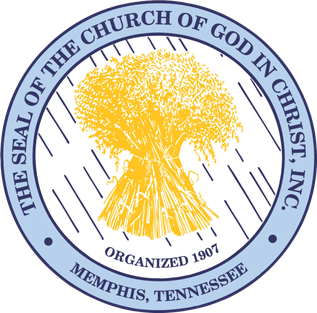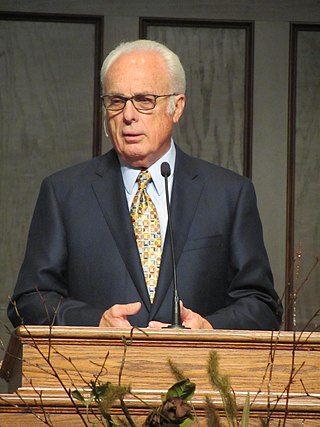Related Research Articles
Sola scriptura is a Christian theological doctrine held by most Protestant Christian denominations, in particular the Lutheran and Reformed traditions, that posits the Bible as the sole infallible source of authority for Christian faith and practice. The Catholic Church considers it heterodox and generally the Orthodox churches consider it to be contrary to the phronema of the Church.

The Church of God in Christ (COGIC) is an international Holiness–Pentecostal Christian denomination, and the largest Pentecostal denomination in the United States. Although an international and multi-ethnic religious organization, it has a predominantly African American membership based within the United States. The international headquarters is in Memphis, Tennessee. The current Presiding Bishop is Bishop John Drew Sheard Sr., who is the Senior Pastor of the Greater Emmanuel Institutional Church of God in Christ of Detroit, Michigan. He was elected as the denomination's leader on March 27, 2021.
Expository preaching, also known as expositional preaching, is a form of preaching that details the meaning of a particular text or passage of Scripture. It explains what the Bible means by what it says. Exegesis is technical and grammatical exposition, a careful drawing out of the exact meaning of a passage in its original context. While the term exposition could be used in connection with any verbal informative teaching on any subject, the term is also used in relation to Bible preaching and teaching. The practice originated from the Jewish tradition of the rabbi giving a "Dvar Torah", explaining a passage from the Torah, during the prayer services. Expository preaching differs from topical preaching in that the former concentrates on a specific text and discusses topics covered therein; whereas, the latter concentrates on a specific topic and references texts covering the topic.
A Protestant/Evangelical Youth Ministry is a Christian Ministry intended to instruct and disciple youths in what it means to be a Christian, how to mature as a Christian, and how to encourage others to claim Jesus as their Saviour through Evangelism and apologetics. This is accomplished through teaching, relationship building and/or mentoring. Youth ministries may vary widely depending on their denomination, size, liberal or conservative outlook and geographic location. The ministries themselves are almost always built on relationships between the youth minister and the student and their shared perception of their relationship to God. Youth have become an integral part of nearly every church’s ministry programming.

In Christianity, a minister is a person authorised by a church or other religious organization to perform functions such as teaching of beliefs; leading services such as weddings, baptisms or funerals; or otherwise providing spiritual guidance to the community. The term is taken from Latin minister. In some church traditions the term is usually used for people who have been ordained, but in other traditions it can also be used for non-ordained.
Marva J. Dawn was an American Christian theologian, author, musician, preacher, and educator. She was associated with the parachurch organization Christians Equipped for Ministry in Vancouver, Washington where she taught Christians around the globe. She also served as a Teaching Fellow in Spiritual Theology at Regent College in Vancouver, British Columbia. Dawn was generally perceived as a Lutheran evangelical. She often wrote in a paleo-orthodox style, stressing the importance of Christian tradition and the wisdom of the Church through the centuries.

Scott Walker Hahn is an American Catholic theologian and Christian apologist. A former Protestant, Hahn was a Presbyterian minister who converted to Catholicism. Hahn's popular works include Rome Sweet Home and The Lamb's Supper: The Mass as Heaven on Earth. His lectures have been featured in multiple audio distributions through Lighthouse Catholic Media. Hahn is known for his research on Early Christianity during the Apostolic Age and various theoretical works concerning the early Church Fathers.

John Fullerton MacArthur Jr. is an American pastor and author who hosts the national Christian radio and television program Grace to You. He has been the pastor of Grace Community Church, a non-denominational church in Sun Valley, California since February 9, 1969. He is currently the chancellor emeritus of The Master's University in Santa Clarita and The Master's Seminary.
Donald Arthur Carson is a Canadian evangelical theologian. He is a Distinguished Emeritus Professor of New Testament at Trinity Evangelical Divinity School and president and co-founder of the Gospel Coalition. He has written or edited about sixty books and served as president of the Evangelical Theological Society in 2022.

The gospel or good news is a theological concept in several religions. In the historical Roman imperial cult and today in Christianity, the gospel is a message about salvation by a divine figure, a savior, who has brought peace or other benefits to humankind. In Ancient Greek religion, the word designated a type of sacrifice or ritual dedication intended to thank the gods upon receiving good news.
Inter-generational or intergenerational ministry is a model of Christian ministry which emphasizes relationships between age groups and encourages mixed-age activities.

Timothy James Keller was an American Calvinist pastor, preacher, theologian, and Christian apologist. He was the chairman and co-founder of Redeemer City to City, which trains pastors for service around the world. He was also the founding pastor of Redeemer Presbyterian Church in New York City and the author of The New York Times bestselling books The Prodigal God: Recovering the Heart of the Christian Faith (2008), Prayer: Experiencing Awe and Intimacy with God (2014), and The Reason for God: Belief in an Age of Skepticism (2008). The prequel for the latter is Making Sense of GOD: An Invitation to the Skeptical (2016).
Modality, in Protestant and Catholic Christian theology, is the structure and organization of the local or universal church. In Catholic theology, the modality is the universal Catholic church. In Protestant theology, the modality is variously described as either the universal church or the local church.
Jack Deere is an American charismatic pastor and theologian.
Bryan Chapell is an American pastor and theologian who currently serves as the Stated Clerk of the Presbyterian Church in America. He was previously the senior pastor of Grace Presbyterian Church in Peoria, Illinois. Prior to that he was president and chancellor of Covenant Theological Seminary in St. Louis, Missouri for twenty years. Chapell is also an author, lecturer, and conference speaker specializing in homiletics. He served as Moderator of the Presbyterian Church in America in 2014.

1 Timothy 2:12 is the twelfth verse of the second chapter of the First Epistle to Timothy. It is often quoted using the King James Version translation:
But I suffer not a woman to teach, nor to usurp authority over the man, but to be in silence.
This is a list of all published works of John F. MacArthur, an evangelical Bible expositor, pastor-teacher of Grace Community Church, and president of The Master's Seminary, in Sun Valley, California. In addition to more than 150 individual books and monographs, MacArthur has also contributed to more than 30 multi-author works. His publications have been translated into more than two dozen languages, including ten or more titles each in French, Spanish, Romanian, German, Korean, Russian, Portuguese, and Italian.

The Bastion of Truth Reformed Churches in the Philippines is a denomination of Christian churches all located in Southern Luzon, the Philippines.

Free Grace United is a Baptist evangelical multisite church affiliated with Converge North Central in Elk River, Minnesota. Free Grace United is one church with 24 locations throughout Minnesota, Iowa, Kenya, and Pakistan with a vision to launch 100 churches by 2040. Each church operates under the same name, mission, values, and statement of faith, but meet in different cities with different pastors. Each FGU church features live preaching.
References
- 1 2 Jones, Perspectives on Family Ministry, 52.
- ↑ Brown, Scott (2010). A Weed in the Church. Merchant Adventures LLC. pp. 61, 231. ISBN 978-0982056745.
- ↑ Jones, Timothy Paul (2009). Perspectives on Family Ministry: Three Views. B&H Academic. p. 42. ISBN 978-0-8054-4845-0.
- ↑ "A Biblical Confession for Uniting Church and Family". Vision Forum. Archived from the original on 5 November 2006. Retrieved 26 February 2011.
- ↑ Bradley, Jr, Lasserre. "What Do Primitive Baptists Believe?". March to Zion. Retrieved 2013-02-24.
- ↑ "Distinctives". Covenant Presbyterian Church Denominational Website. Retrieved 2013-02-24.
- ↑ Phillips, Doug. "Church Leaders Discuss Family-Integrated Churches". Vision Forum Ministries. Archived from the original on 6 January 2007. Retrieved 17 November 2013.
- ↑ McDonogh, Gary W. (1993). Black and Catholic in Savannah, Georgia. Univ. of Tennessee Press. p. 300. ISBN 978-0-87049-811-4.
- ↑ Gerberding, George Henry (1902). The Lutheran Pastor. Lutheran publication society. p. 343.
- ↑ "The Mission Of The National Center For Family Integrated Churches". The National Center for Family Integrated Churches. Retrieved 2015-01-15.
- ↑ "Church network". National Center for Family-Integrated Churches. Retrieved 25 February 2011.
- ↑ "Church listing sign up". National Center for Family-Integrated Churches. Retrieved 12 October 2012.
- ↑ Renfro, Paul (2009). "Family-Integrated Ministry". Perspectives on Family Ministry: Three Views. B&H Academic. pp. 68–69.
- ↑ Brown, Scott. "About". Scott Brown Online.
- ↑ Barrick, Audrey (9 February 2011). "Recovering the Sufficiency of Scripture in the Family, Church". The Christian Post . Retrieved 26 February 2011.
- ↑ Brown, Scott T. "My Top Four Favorite Family-Integrated Church Pastors". Vision Forum. Archived from the original on 5 December 2006. Retrieved 25 February 2011.
- ↑ Winslett, Ben. "Family Integrated Worship - God Ordained and Safe". March to Zion. Retrieved 2013-02-24.
- ↑ Köstenberger, Andreas J. God, Marriage, and Family: Rebuilding the Biblical Foundation (Crossway Books, 2004), p. 259.
- ↑ Kostenberger, God, Marriage, and Family, p. 258.
- ↑ R. C. Sproul, Jr., Ask RC: We can’t find a family integrated church, what should we do?, 22 July 2011.
- ↑ Mathis, Shawn C. "What Is a Family Integrated Church?: Rejecting activities which separate children from parents". The Aquila Report. Retrieved 2013-02-24.
- ↑ Timothy Paul Jones, “Catechism Classes and Other Surprising Precedents for Age-Organized Ministry,” Navigating Student Ministry, edited by Timothy McKnight (B&H Academic, 2022) 301–332. ( ISBN 1462773362)
- ↑ John B. Carpenter, "If the Family Is Central, Christ Isn't", The Christian Post, March 26, 2013.